


Cerro Gordo County, Iowa
Part of the IAGenWeb Project
Behind the Music
• The original name of "The Music Man" was "The Silver Triangle". Producers Cy Feuer and Ernie Martin told Willson he needed a better title. Then they were the ones that came up with "The Music Man". • Frank Loesser, the creator of "Guys and Dolls", beginning in 1949, encouraged Meredith to write a musical about his childhood home, Mason City. He continued to mentor Meredith, co-producing "The Music Man", and publishing the songs from the show under the company, Frank Music. Frank Music is now owned by ex-Beatle Paul McCartney. • The character Tommy Djilas’ last name came from a New York City Bulgarian delicatessen worker Willson knew. • The character Marcellus Washburn — Harold Hill’s sidekick — was the name of the manager of the Mason City B.F. Goodrich tire store in 1918. • Eulalie Shinn’s (the wife of Mayor Shin) first name came from a high school classmate of Willson’s named Eulalie Johnson.
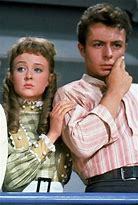
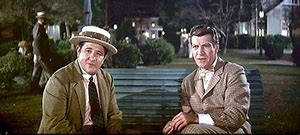
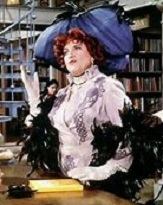
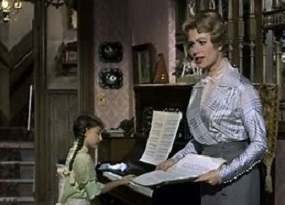 • Rosalie Willson put Meredith Willson through the dreaded five-finger exercises on the piano. This was recreated in "The Music Man" with Marian Paroo teaching her student Amaryllis. • As a kid in the winter, Willson and his friends would grab onto the runners of the Wells Fargo Wagon to hitch rides. • At first, in The Music Man’s book, there was a spastic boy in a wheelchair, the son of a janitor, whose daily challenges were part of the story. Finally, under pressure from producers Cy Feuer and Ernie Martin, it was Martin who said the kid would steal every scene he was in, and later, the director, Morton da Costa, dropped this boy, substituting Winthrop Paroo, who had a lisp. Winthrop was based on a kid Meredith knew from his childhood in Mason City, named Charlie Haverdegraine, who had a lisp and played harmonica very well. Meredith thought his lisp helped him play the harmonica so well, so he asked Charlie to teach him how to lisp. • The barbershop quartet in The Music Man was based on a barbershop quartet in Mason City that Meredith knew, called "The Rusty Hinges". Meredith himself was in a barbershop quartet group. • Actors that were considered for the lead in the original "The Music Man" (before Robert Preston landed the role) included Van Heflin, Jackie Gleason, Danny Kaye, Lloyd Bridges, Gene Kelly, Dan Dailey, Ray Bolger, Bert Parks, Art Carney, Jason Robards, Milton Berle, Laurence Olivier, Alec Guinness, James Cagney, James Whitemore, Andy Griffith and Phil Harris.
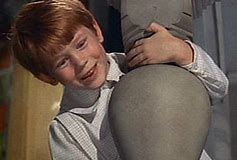
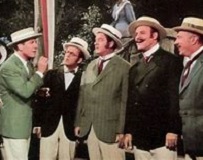
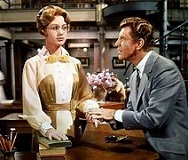 • There’re a couple of scenes in "The Music Man" where Harold Hill keeps Tommy Djilas busy inventing a way for a piccolo player to be able to read music while playing. The way this played out in the show is identical to the real-life experience Meredith had himself as a young man with a Mr. Bushgens, who owned a harness shop in Mason City. In 1915 he fiddled with ways to make music readable to a piccolo player. One was an elaborate breastplate affair that tied in the back with several laces. Swooping out from the breastplate was a curved arm and soldered onto this a lyre to hold the music. Willson strapped it on and tried it at a rehearsal but as he marched it bobbed and the music came right out of the lyre. Then he tried an upright lyre on a wide leather buckle around the upper left biceps. But this cut off Meredith’s circulation and his left arm and fingers went numb. • Along the way, Willson wrote 40 songs for "The Music Man". 22 of them were cut. They include "You Don’t Have to Kiss Me Goodnight" (sung by Tommy to Zaneeta), a partner song for "My White Knight" harmonizing with "A Sadder but Wiser Girl". "Iowuh" that had a Native American beat. "Blessings" was written during the out-of-town run in Philadelphia, but was dropped. Also dropped were "I’ve Already Started to Try to Figure Out a Way to Work To Try to Get to You", "I Found a Horseshoe", "My Baby", "Tomorrow", "Chicago", and a salesman’s version of "Ya Got Trouble". • Willson originally wrote the tune for "Till There was You" in 1950, when it was entitled "Till I Met You".
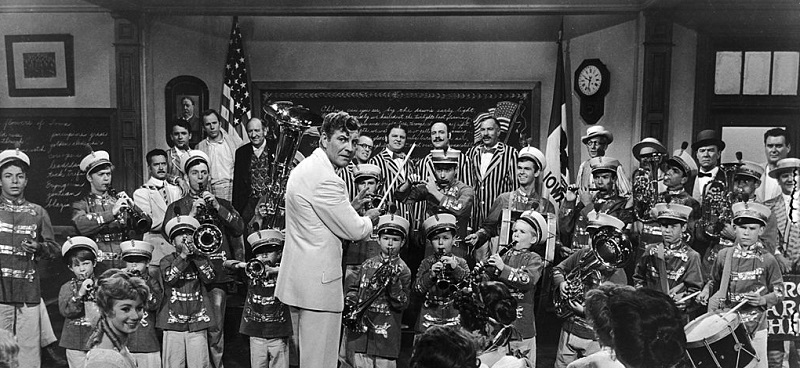 • Rosalie’s mother’s name was Lida, as was Rosalie’s favorite sister, Lida, who lived in Topeka. The song "Lida Rose" was specifically inspired by his mother and aunt. • Willson’s grandfather Alonzo established the first public library in Mason City. And his mother used to take him to the library on Saturday nights. Hence Marian the librarian. • The song that the band is exhorted to play by Harold Hill in "The Music Man" is "Minuet in G". This song was played by Meredith’s high school band. It was the only piece they could play all the way through without stopping.
• Mason City’s first high school band began in 1912, the year in which "The Music Man" takes place. Meredith played piccolo in this band. The band had 2 clarinets, 2 cornets, 1 euphonium, 1 tuba, 1 snare drum, 1 bass drum 1trombone and 1 alto sax. • The name Marian came from Marion McGuire, a senior in Mason City High School in 1912, and a cellist in its orchestra. • The name "Harold" for Harold Hill came from Meredith’s childhood friend Harold Keidle, with whom he played in a trio called "The Jones Brothers". The trio included Meredith’s brother Cedric, who also later played in Sousa’s band. • The Meredith Willson Residence Hall — an entire floor — opened at the Juilliard School, in October of 1990. Willson attended the school under its previous name of Damrosch School of Music. • In 1955, Meredith Willson and Walt Disney founded The Big Brothers of Greater Los Angeles (now expanded to include Big Sisters and still going strong.) • The cast recording of "The Music Man" won the first Grammy Award ever issued, in 1959. • In 1950, Meredith Willson wrote a fight song for the University of Iowa, which is still played to this day. In 1953, he wrote a fight song for Iowa State University that is still also still played. • In 1999, a commemorative stamp with Meredith’s picture on it was issued.
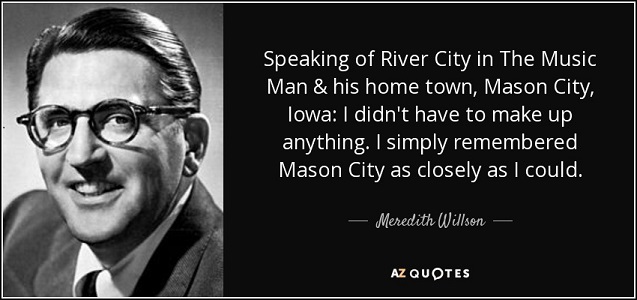
SOURCE: https://www.commentarymagazine.com/articles/the-man-behind-the-music-man/
|